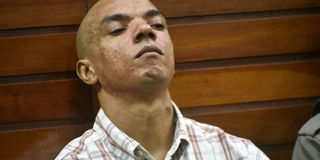Jermaine Grant gets four more years in jail

Briton Jermaine Grant awaiting his sentencing in a Mombasa court. He will serve four years in prison for possession of explosives. PHOTO | KEVIN ODIT | NATION MEDIA GROUP
What you need to know:
He is currently serving a nine-year prison term after he was found guilty of nine charges, among them an attempt to register a birth certificate.
Prosecutor Jacob Ondari argued that the sentence should be proportional to the gravity of the offence.
Mr Ondari argued that the accused had previous convictions, the last being serving a nine-year prison term that commenced in 2015.
Briton Jermaine Grant has been sentenced to four years’ imprisonment after he was found guilty of being in possession of explosives.
Mombasa Chief Magistrate Evans Makori noted that there was no record from prison authorities on Grant’s behaviour.
He is currently serving a nine-year prison term after he was found guilty of nine charges, among them an attempt to register a birth certificate.
“He is serving a lawful sentence albeit this case has dragged on, that too has to be considered,” said Mr Makori.
GRAVITY OF OFFENCE
The magistrate noted that the factors to consider on whether to impose a custodial or non-custodial sentence include the gravity of the offence and the criminal history and character of the offender.
Mr Makori said the case against Grant does not fall under terror-related trials as the Prevention of Terrorism Act was enacted in 2012, a year after the offence was said to have been committed.
Prosecutor Jacob Ondari argued that the sentence should be proportional to the gravity of the offence.
Mr Ondari argued that the accused had previous convictions, the last being serving a nine-year prison term that commenced in 2015.
Through lawyer Chacha Mwita, Grant told the court that he was remorseful despite disagreeing with some aspects of the judgment.
“I call on the court to consider the period he has been in custody — it is more than the maximum sentence (for the offence),” said Mr Chacha.
Prosecutors, the lawyer argued, had not presented any aggravating circumstances to empower the court to impose a maximum sentence.
Grant was found guilty of possessing explosives, which included acetone, hydrogen peroxide, ammonium nitrate, sulphur sublime container, four AA-size batteries and a conducting wire. The materials were suspected to be intended for use in making explosives for launching a terrorist attack.





